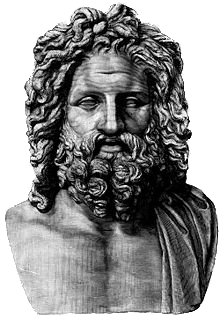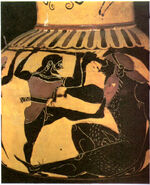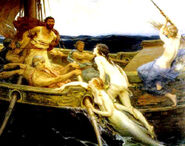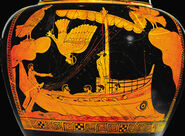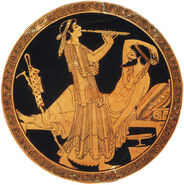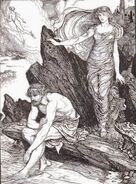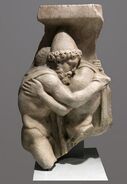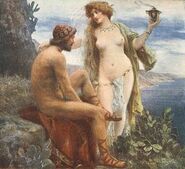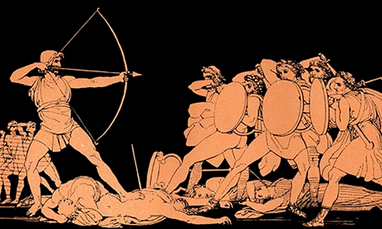
Odysseus shooting the suitors
Odysseus or his Roman name Ulysses was the king of Ithaca, and he ruled an island country that was west of Greece. He was the husband of Penelope, father of Telemachus, and son of Laërtes and Anticlea. He is a main character in the Iliad, and the Odyssey is about his ten-year-voyage from the Trojan War to Ithaca.
Parents[]
Laërtes & Antiklea
Mythology[]
Before the Trojan War[]
When Helen was abducted, Menelaus called upon the other suitors to honor their oaths and help him to retrieve her, thus forging the Trojan War. Odysseus tried to avoid it by feigning lunacy, as an oracle had prophesied a long-delayed return home for him if he went. He hooked a donkey and an ox to his plough (as they have different stride lengths, hindering the efficiency of the plough) and sowing his fields with salt. Palamedes, at the behest of Menelaus's brother Agamemnon, sought to disprove Odysseus's madness, and placed Telemachus, Odysseus's infant son, in front of the plough. Odysseus veered the plough away from his son, thus destroying his ruse. Odysseus held a grudge against Palamedes during the war for dragging him away from his home.
Odysseus and other envoys of Agamemnon traveled to Scyros to recruit Achilles because of a prophecy that Troy could not be taken without him. By most accounts, Thetis, Akhilles's mother, disguised the youth as a woman to hide him from the recruiters because an oracle had predicted that Achilles would either live a long, uneventful life or achieve everlasting glory while dying young. Odysseus cleverly discovered which of the men before him was Akhilles when the youth stepped forward to examine an array of weapons. Some accounts say that Odysseus arranged for the sounding of a battle horn, which prompted Akhilles to clutch a weapon.
Just before the war began, Odysseus accompanied Menelaus and Palamedes in an attempt to negotiate Helen's peaceful return. Menelaus made unpersuasive emotional arguments, but Odysseus's arguments very nearly persuaded the Trojan court to hand Helen over.
During the Trojan War[]
Odysseus was one of the main Akhaean leaders in the Trojan War. The others were "godlike" Achilles, Agamemnon "lord of men", Menelaus, Idomeneus, Nestor, Telamonian Ajax and Ajax the Lesser, Diomedes and Teucer the master archer.
The Iliad[]
Main article: Iliad
Odysseus was one of the most influential Greek champions during the Trojan War. Along with Nestor and Idomeneus he was one of the most trusted counsellors and advisers. He always championed the Achaean cause, especially when the king was in question, as in one instance when Thersites spoke against him. When Agamemnon, to test the morale of the Akhaeans, announced his intentions to depart Troy, Odysseus restored order to the Greek camp. Later on, after many of the heroes had left the battlefield due to injuries (including Odysseus and Agamemnon), Odysseus once again persuaded Agamemnon not to withdraw. Along with two other envoys, he was chosen in the failed embassy to try to persuade Achilles to return to combat.
When Hector proposed a single combat duel, Odysseus was one of the Danaans who volunteered to battle him. Telamonian Ajax, however, was the volunteer who eventually did fight Hector. Odysseus aided Diomedes during the successful night operations in order to kill Rhesus, because it had been foretold that if his horses drank from the Scamander river Troy could not be taken.
After Patroclus had been slain, it was Odysseus who counselled Akhilles to let the Akhaean men eat and rest rather than follow his rage-driven desire to go back on the offensive—and kill Trojans—immediately. Eventually (and reluctantly), he consented.
During the funeral games for Patroclus, Odysseus became involved in a wrestling match with Telamonian Ajax, as well as a foot race. With the help of the goddess Athena, who favoured him, and despite Apollo helping another of the competitors, he won the race and managed to draw the wrestling match, to the surprise of all.
Other stories[]
When the Achaean ships reached the beach of Troy, no one would jump ashore, since there was an oracle that the first Achaean to jump on Trojan soil would die. Odysseus tossed his shield on the shore and jumped on his shield. He was followed by Protesilaus, who jumped on Trojan soil and later became the first to die.
Odysseus never forgave Palamedes for unmasking his madness ruse, leading him to frame him as a traitor. At one point, Odysseus convinced a Trojan captive to write a letter pretending to be from Palamedes. A sum of gold was mentioned to have been sent as a reward for Palamedes's treachery. Odysseus then killed the prisoner and hid the gold in Palamedes's tent. He ensured that the letter was found and acquired by Agamemnon, and also gave hints directing the Argives to the gold. This was evidence enough for the Greeks and they had Palamedes stoned to death. Other sources say that Odysseus and Diomedes goaded Palamedes into descending a wall with the prospect of treasure being at the bottom. When Palamedes reached the bottom, the two proceeded to bury him with stones, killing him.
When Achilles was slain in battle, it was Odysseus and Telamonian Ajax who successfully retrieved the fallen warrior's body and armour in the thick of heavy fighting. During the funeral games for Achilles, Odysseus competed once again with Telamonian Ajax. Thetis said that the arms of Achilles would go to the bravest of the Greeks, but only these two warriors dared lay claim to that title. The two Argives became embroiled in a heavy dispute about one another's merits to receive the reward. The Greeks dithered out of fear in deciding a winner, because they did not want to insult one and have him abandon the war effort. Nestor suggested that they allow the captive Trojans decide the winner. Some accounts disagree, suggesting that the Greeks held a secret vote. In any case, Odysseus was the winner. Enraged and humiliated, Ajax was driven mad by Athena. When he returned to his senses, in shame at how he had slaughtered livestock in his madness, Ajax killed himself by the sword that Hector had given him
Together with Diomedes, Odysseus went to fetch Achilles's son, Pyrrhus, to come to the aid of the Achaeans, because an oracle had stated that Troy could not be taken without him. A great warrior, Pyrrhus was named Neoptolemus (Greek: "new hero"). Upon the success of the mission, Odysseus gave him the armaments of his father.
It was later learned that the war could not be won without the poison arrows of Heracles, which were owned by the abandoned Philoctetes. Odysseus and Diomedes (or, according to some accounts, Odysseus and Neoptolemus) went out to retrieve them. Upon their arrival, Philoctetes (still suffering from the wound) was seen still to be enraged at the Danaans, especially Odysseus, for abandoning him. Although his first instinct was to shoot Odysseus, his anger was eventually diffused by Odysseus's persuasive powers and the influence of the gods. Odysseus returned to the Argive camp with Philoctetes and his arrows.
Odysseus captured Priam's son, Helenus the prophet, who told the Greeks that Troy could not be taken without the capture of the Palladium, which was located in the city itself. (Some accounts hold that Helenus was the one that told the Greeks to recruit Neoptolemus and Philoctetes.) Once again, Odysseus and Diomedes went on a mission together to fulfill a prophecy. Some say that Diomedes crawled up on Odysseus's shoulders into the city but would not help Odysseus up to do the same. When Diomedes returned from stealing the Palladium and met up again with the infuriated Odysseus, the latter thought to kill him and take credit for himself. He stepped behind him so as to stab him with his sword, but Diomedes caught the glint in the moonlight and spun around and disarmed the Ithacan king. He then proceeded to drive Odysseus back to the Argive camp with the flat of his sword. Another account of the stealing of the Palladium states that Odysseus and Diomedes entered the city together.
Some myths state that Odysseus, in the disguise of a beggar, covered in rags and blood, entered the Trojan city furtively and alone. He was recognized by no one except Helen and Hecuba. They questioned him but allowed him to return to the Greek camp unharmed.
The famous Trojan Horse was devised by Odysseus. It was built by Epeius and filled with Greek warriors, led by Odysseus. Beforehand, he made Menelaus swear to give him whatever he wanted after they had taken Troy and was met with concord. When the Horse was taken into Troy, Odysseus and Menelaus descended from it and went directly to Prince Deiphobos's house, where they engaged in a ferocious battle, although some accounts say that Odysseus fought him and that Menelaus came to find the dead body. Ultimately, however, Deiphobos, who was then the leading son of Priam and Helen's third husband, was killed. Menelaus was about to kill Helen for leaving him when Odysseus took advantage of the earlier promise and made him swear not to.
The Odyssey[]
The Cicones[]
After Odysseus left Troy he came first to Ismarus, the land of the Cicones. His crew sacked the town, and divided up the booty fairly. Odysseus then (according to his account given to Alcinous) gave orders to leave, but his men were anxious to stay and feast. The Cicones rallied back up with troops who had chariots from inland and launched a surprise attack. In a large battle by the ships Odysseus and his men fought valiantly, but as the battle dragged on the Cicones broke their defensive line. Odysseus lost six men from each of his ships before they fled.
The Lotus-Eaters[]
Ismarus is the last definite historical location Odysseus visited. As if to emphasise his passing into the land of myth and legend, he was driven for ten days When Odysseus and his men landed on the island of the Lotus-Eaters, Odysseus sent out a scouting party of three men who ate the lotus flowers with the natives. This caused them to stop caring about going home, and desire only to eat the lotus. Odysseus went after the scouting party, and dragged them back to the ship against their will. He set sail, with the drugged sailors tied to the rowing benches to prevent them from swimming back to the island.
Polyphemos[]
Odysseus landed on an island full of goats. Nearby, within earshot, was the territory of the Kyklopes. Drawn by the sounds of civilisation, Odysseus sailed over to it with a single ship. He took a dozen men with him as a scouting party (including Achaemenides and Antiphus) and entered a large cave. They did not realise that it was the dwelling of Polyphemos the Kyklops. When he returned, he refused hospitality to his uninvited guests, and trapped them in the cave by blocking the entrance with a boulder that could not be moved by mortal men. He then proceeded to eat a pair of them at each meal, finally eating Antiphus as one of the third pair, but Odysseus devised a cunning plan. He and his men turned the olive tree branch which Polyphemos used to shepherd his flocks with into a giant spear, while Polyphemos was out of the cave shepherding his flocks.
To lower Polyphemos's guard, Odysseus gave him the strong, unwatered wine given them by Maron, the Ismaran priest of Apollo. When the thoroughly inebriated Polyphemos asked for his name, Odysseus told him that it was "Noman". (Οὔτις, "Noman", is also a short form of his own name - a word game which is lost in translated versions.) In thanks for the wine, Polyphemos offered to eat him last. Once the giant fell asleep, Odysseus and his men drove their specially fashioned spear through his single eye, and blinded him. Hearing Polyphemos's cries, other Kyklopes called up to his cave to ask what was wrong. Polyphemus replied, "Οὖτίς με κτείνει δόλῳ οὐδὲ βίηφιν." ("Noman is killing me either by treachery or brute violence!") The other Kyklopes let him be, thinking that his outbursts must be either madness or the will of the gods.
In the morning, Polyphemos rolled back the boulder to let the sheep out to graze. Now blind, he could not see the men, but he felt the tops of his sheep to make sure that the men were not riding them, and spread his arm at the entrance of the cave. Odysseus and his six remaining men escaped, however, by tying themselves to the undersides of three sheep each. Once out, they loaded the sheep aboard their ship and set sail. According to Virgil, they accidentally left Akhaemenides behind in their rush.
As Odysseus and his men were sailing away, he revealed his true identity to Polyphemos. Enraged, Polyphemos tried to sink the ship with boulders, but, because he was blind, he missed, although the rocks landed close enough to rock the ship. When the ship appeared to be getting away at last, Polyphemos raised his arms to his father, Poseidon, and asked him to not allow Odysseus to get back home to Ithaca. If this could not be granted, however, he must arrive alone, his crew dead, in a stranger's ship.
Aeolus[]
Continuing his journey, Odysseus stopped at Aeolia, the home of Aeolus, the mortal favoured by the gods enough to be given the power of controlling the winds. Aeolus gave Odysseus and his crew hospitality for a month, in return for Odysseus's interesting stories. Aeolus also provided a bag filled with all winds but the one to lead him home. Because Odysseus guarded the bag for the entire voyage home, without so much as a wink of sleep, his crew suspected that some treasure might be in it. They decided to open it as soon as he fell asleep — just before their home was reached. They were immediately blown back to Aeolia by a violent storm. Aeolus refused to offer any more help because he realized that Odysseus must be cursed by the gods. Odysseus had to begin his journey from Aeolia to Ithaca over again. Although heartbroken, he hid his feelings from his crew.
The Laestrygonians[]
They came next to Telepylos, the stronghold of Lamos, king of the Laestrygonians. Odysseus's ships entered a harbour surrounded by steep cliffs, with a single entrance between two headlands. The captains took their ships inside and made them fast close to one another, where it was dead calm. Odysseus kept his own ship outside the harbour, moored to a rock. He could see nothing but some smoke rising from over the horizon. He sent two of his company with an attendant to investigate the inhabitants.
The men followed a road and eventually met a young woman, who said she was a daughter of Antiphates (another name for Lamos), the king, and directed them to his house. When they arrived there, however, they found a gigantic woman, the wife of Antiphates who promptly called her husband. He immediately left the assembly of the people and, on arrival, snatched up one of the men and started to eat him. The other two ran away, but Antiphates raised a hue-and-cry. Soon they were pursued by many Laestrygonians - men with the strength of giants - who threw vast rocks from the cliffs, smashing the ships, and speared the men like fish.
Odysseus escaped with his single ship due only to the fact that it was not trapped in the harbour. The rest of his company was lost.
According to Virgil's Aeneid, Achaemenides was one of Odysseus's crew who stayed on Sicily with Polyphemus until Aeneas arrived and took him with him. Virgil was probably trying to interweave his tale as much as possible with Homer's already ancient, great work, especially as Achaemenides had nothing to do with the story at all and was in fact never mentioned again.
Kirke[]
The next stop was Aeaea, the island of the enchantress Kirke, where Odysseus sent ahead a scouting party. Kirke invited the scouting party in for a meal, and turned all the men into swine after they ate food laced with one of her magical sleep-inducing potions. Only the leader of the scouting party, Eurylochus, suspecting treachery from the outset, escaped to warn Odysseus and the others, who had stayed behind with the ships.
Odysseus, against Eurylochus's advice, set forth to rescue his transfigured men but was intercepted by Hermes and told to procure the herb moly , which would protect him from a similar fate. When it neutralized her magic, he threatened to kill her. She begged for mercy, and offered to sleep with him. He forced her to swear not to plot against him any longer, then obliged by Hermes's counsel. He then refused to eat and drink until his crew was turned back into humans. When she had done this, she asked Odysseus to stay. This he did, for an entire year. He eventually left Aeaea at the insistence of his crew. Circe agreed that it was time for him to go, and gave him advice about the remainder of his journey. During the preparation for departure, however, Odysseus's youngest crewman, Elpenor, fell from a roof and died.
Circe subsequently bore Odysseus a son, Telegonus, who would eventually cause his father's death.(not from book)
Journey to the Underworld[]
After speaking to Kirke, Odysseus decided to talk with Tiresias, so he and his men journeyed to the River Acheron in Hades, where they performed sacrifices which allowed them to speak to the dead. Odysseus sacrificed a ram, attracting the dead spirits to the blood. He held them at bay and demanded to speak with Tiresias, who told him how to pass by Helios's cattle and the whirlpool-causing monster Charybdis. Tiresias also told him that, after his return to Ithaca, he must take a well-made oar and walk inland with it to parts where no-one mixed sea salt with food, until someone asked him why he carries a winnowing fan. At that place, he must fix the oar in the ground and make a sacrifice to appease Poseidon. Tiresias also told Odysseus that, after that was done, he would die an old man, "full of years and peace of mind"; his death would come from the sea and his life ebb away gently. (Some read this as saying that his death would come away from the sea, as opposed to out of the sea.)
While in Hades, Odysseus also met Achilles (who told him that he would rather be a slave on earth than the king of the dead), Agamemnon, and his mother, Anticlea. The soul of Ajax, still sulking about Achilles's armour, refused to speak to Odysseus, despite the latter's pleas of regret.
Odysseus also met his comrade, Elpenor, who told him of the manner of his death and begged him to give him an honorable burial.
The Sirens[]
At Elpenor's funeral, Circe warned Odysseus of the dangers of the singing creatures (The Sirens) who lured men to their death on the rocks around their island. She advised him to avoid them but said that, if he really felt that he must listen, he should have his men plug their ears with beeswax and tie him to the mast to keep him from escaping.
Odysseus told his men to do so. As they passed the island, the three Sirens began to sing beautifully, promising him wisdom and knowledge of past and future. Enchanted by their song, he struggled and tried to break free, but Eurylochus and Perimedes bound him even more tightly until they passed beyond the island.
Skylla and Kharybdis[]
Odysseus had been told by Circe that he would have a choice between two paths home. One was the Wandering Rocks, where either all made it through or all died, and which had only previously been passed by Jason, with Zeus's help. Odysseus, however, chose the second path: on one side of the strait was a monster called Charybdis, whose whirlpool would sink the ship; on the other was a monster called Skylla, daughter of Crataeis, who had six heads and could seize and eat six men.
The advice was to sail close to Scylla and lose six men but not to fight, lest they should lose more men. Odysseus did not dare tell his crew of the sacrifice, or they would have cowered below and not rowed, in which case all would have ended up in Charybdis. Six men duly died. Odysseus said that the desperate cries of the wretched, betrayed men were the worst thing he had ever known. Clearly this affected morale and left the survivors feeling mutinous.
The Cattle of Helios[]
Finally, Odysseus and his surviving crew approached an island, Thrinacia, which was sacred to Helios, who kept hallowed cattle there. Odysseus, having been warned by Tiresias and Circe not to touch these cattle, told his men that they would not land there. Eurylochus first argued that the men were mourning, then refused to travel by night and finally threatened mutiny. Outnumbered, Odysseus gave in.
The men were soon trapped on the island by adverse winds and, after their food stores had run out, began to get hungry. Odysseus went inland to pray for help and fell asleep. In his absence, Eurylochus reasoned that they might as well eat the cattle and be killed by the gods as die of starvation, and claimed that they would offer sacrifices and treasure to appease the gods if they returned alive to Ithaca. When they slaughtered the cattle, the guardians of the island, Helios's daughters Lampetia and Phaethusa, told their father, who told to Zeus that he would take the sun down to Hades if justice was not done. When the ship put to sea, a storm conjured by Zeus killed all the rest but Odysseus. The crewless ship was sucked into Charybdis, but Odysseus survived by clinging to an olive tree below Scylla's cave. When Charybdis spat out the remains of his ship, he let go and landed on the keel, which drifted across the sea for nine days. Then on the tenth day, he was washed up on an island.
Calypso and the Phaeacians[]
The island, Ogygia, was home to the nymph Calypso (daughter of Atlas), who held Odysseus captive as her lover for seven years, promising him immortality if he agreed to stay. On behalf of Athena, Zeus intervened and sent Hermes to tell Calypso to let him go.
Odysseus duly departed on a small raft, furnished by Calypso with provisions of water, wine and food, only to be hit by a storm from his old enemy Poseidon. He was washed up on the island of Scheria and found by Nausicaa, the daughter of King Alcinous and Queen Arete of the Phaeacians, who entertained him well. The bard Demodocus sung a song about the Trojan War. As Odysseus, as yet unidentified by the Phaeacians, had been at Troy and longed to return home, he wept at it, at which point Alcinous pressed him for his true identity.
It is here that the story of Odysseus's trip from Troy to Scheria, which occupies books nine to twelve of The Odyssey, is told. After his recital, the Phaeacians offer him passage home, with all the hoardings he obtained along the way and the gifts the Phaecians themselves bestowed upon him (showing xenia, the idea of hospitality). King Alcinous provided one fast Phæacian ship that soon[10] carried Odysseus home to Ithaca.
Poseidon, on seeing Odysseus's return, was furious and decided to cast a ring of mountains around Scheria so that they could never sail again. This would have been very damaging to the Phaeacians, for they were seafarers, but Zeus persuaded Poseidon not to go ahead with the idea. Instead, he turned the ship on which Odysseus journeyed home to stone.
Odysseus reaches Ithaca[]
Back in Ithaca, Penelope was having difficulties, her husband having been gone for twenty years. She did not know whether he was alive or dead, and was beset with numerous men who thought that a fairly young widow and queen of a small but tidy kingdom was a great prize: they pestered her to declare Odysseus dead and choose a new husband. They loitered about the palace, eating her food, drinking her wine and consorting with her maidservants. Penelope was despondent about her husband's absence, especially the mystery of his fate. He could come home at any time—or never. Temporising, she fended the suitors off for years, using stalling tactics that eventually began to wear thin. Meanwhile, Odysseus's mother, Anticlea, died of grief, and his father, Laërtes, was not far off the same end.
Odysseus arrived on Ithaca alone. Upon landing, he was disguised by Athena as an old man or beggar, and welcomed by his old swineherd, Eumaeus, who did not recognize him but nevertheless treated him well. Odysseus's faithful dog, Argos, was the first to recognize him. Aged and decrepit, the animal did its best to wag its tail, but Odysseus did not want to be found out and had to maintain his cover, so the weary dog died in peace. His son, Telemachus, after returning from a year of searching for information about his father, was the first human to know his father returned after Athena revealed Odysseus for who he was in front of him. The second human to recognize him was his old wet nurse, Euryclea, who knew him well enough to see through his rags, recognising an old scar on his leg, received while hunting boar with Autolycus's sons.
Odysseus learned that Penelope had remained faithful to him, pretending to weave a burial shroud for his father, and claiming that she would only choose a suitor when she was finished. Every day she wove a length of shroud, and every night undid her work, until one day a maid betrayed her. The suitors demanded that she finally choose a new husband.
When Odysseus arrived at his house, disguised as a beggar, he sat in the hall, where he observed the suitors and was repeatedly humiliated by them. Presently, he went to Penelope and told her that he had met Odysseus, spinning a haughty tale about his bravery in battle. Penelope, still ignorant of the beggar's identity, began to cry. She went to the suitors and told them that whoever could string Odysseus's bow and shoot an arrow through 12 axe-handles would marry her. This was to Odysseus's advantage, as only he could string his bow. It is believed that his bow was a composite, requiring great skill and leverage to string, rather than brute strength. Penelope then announced what he, as the beggar, had told her.
The suitors each tried to string the bow, but their attempts were in vain. Odysseus then took it, strung it, lined up twelve axe-handles and shot an arrow through all twelve. Athena then took off his disguise, and, with the help of his son, Philoteus and Eumaeus, he slaughtered all the suitors. Antinous was the first to be slain, taking an arrow fired by Odysseus in the throat while drinking in the great hall. Odysseus used arrows first, but, when he eventually ran short, he killed the remaining suitors with spears. Caught by surprise and deprived of arms by Telemachus, the suitors at a distinct disadvantage, and were only able to arm themselves after it was too late. When all the suitors were dead, justice was meted out to the goatherd Melanthius and the female servants, who had been helping the suitors.
Penelope, still not certain that the beggar was indeed her husband, tested him. She ordered her maid to make up Odysseus's bed and move it from their bedchamber into the hall outside his room. Odysseus was furious when he heard this because one of the bed posts was made from a living olive tree. He himself had designed it this way; it could not be moved unless by a god. He told her this, and, since only he and she knew of it, she accepted that he was indeed her husband. She came running to him, hoping that he would forgive her. He did, firstly because he could understand why she had tested him and secondly because he had passed the test.
To avenge the death of his son Antinous, Eupeithes tried to kill Odysseus. Laërtes killed him, and Athena thereafter required the suitors' families and Odysseus to make peace. Thus ends the story of the Odyssey.


